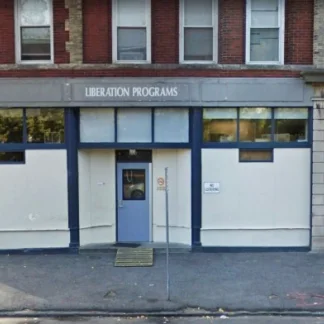Addiction Recovery Center - Greenwich Hospital
Addiction Recovery Center – Greenwich Hospital is a private rehab located in Gre...
Liberation Programs is a co-occurring mental health disorder and addiction treatment center in Stamford, CT. The facility provides services to adults struggling with addiction with the goal of helping individuals restore their lives.
Providing services to over 1,000 individuals a day, Liberation Programs provides treatment and prevention services for substance use and mental health disorders with the goal of helping individuals and families overcome addiction in order to restore their lives and ultimately strengthen our communities.
Liberation’s outpatient programs provide treatment services six days per week. While addressing health issues, individuals are encouraged to embrace a life of sobriety and improve their quality of life by making behavior changes. Included in their outpatient services is their intensive outpatient program (IOP), medication assisted treatment (MAT), individual and group counseling, family therapy, and more.
Liberation provides services for adults, youth, and families through two inpatient treatment programs. They employ recovery coaches who serve as a source of hope and support. By combining therapy and supportive services, patients are able to learn self sufficiency to help enable them to sustain recovery long after they complete their care program.
Contact us for more information: (203) 356-1980

Connect with Liberation Programs - Liberation House by calling their admissions team directly.
(203) 356-1980 Website Get DirectionsThe Commission on Accreditation of Rehabilitation Facilities (CARF) is a non-profit organization that specifically accredits rehab organizations. Founded in 1966, CARF's, mission is to help service providers like rehab facilities maintain high standards of care.
CARF Accreditation: Yes
Group therapy is any therapeutic work that happens in a group (not one-on-one). There are a number of different group therapy modalities, including support groups, experiential therapy, psycho-education, and more. Group therapy involves treatment as well as processing interaction between group members.
In individual therapy, a patient meets one-on-one with a trained psychologist or counselor. Therapy is a pivotal part of effective substance abuse treatment, as it often covers root causes of addiction, including challenges faced by the patient in their social, family, and work/school life.
Trauma therapy addresses traumatic incidents from a client's past that are likely affecting their present-day experience. Trauma is often one of the primary triggers and potential causes of addiction, and can stem from child sexual abuse, domestic violence, having a parent with a mental illness, losing one or both parents at a young age, teenage or adult sexual assault, or any number of other factors. The purpose of trauma therapy is to allow a patient to process trauma and move through and past it, with the help of trained and compassionate mental health professionals.
In individual therapy, a patient meets one-on-one with a trained psychologist or counselor. Therapy is a pivotal part of effective substance abuse treatment, as it often covers root causes of addiction, including challenges faced by the patient in their social, family, and work/school life.
Trauma therapy addresses traumatic incidents from a client's past that are likely affecting their present-day experience. Trauma is often one of the primary triggers and potential causes of addiction, and can stem from child sexual abuse, domestic violence, having a parent with a mental illness, losing one or both parents at a young age, teenage or adult sexual assault, or any number of other factors. The purpose of trauma therapy is to allow a patient to process trauma and move through and past it, with the help of trained and compassionate mental health professionals.
Trauma therapy addresses traumatic incidents from a client's past that are likely affecting their present-day experience. Trauma is often one of the primary triggers and potential causes of addiction, and can stem from child sexual abuse, domestic violence, having a parent with a mental illness, losing one or both parents at a young age, teenage or adult sexual assault, or any number of other factors. The purpose of trauma therapy is to allow a patient to process trauma and move through and past it, with the help of trained and compassionate mental health professionals.
Addiction Recovery Center – Greenwich Hospital is a private rehab located in Gre...
Southwest Connecticut Mental Health System is a public rehab located in Stamford...
Backcountry Wellness for Eating Disorders is a private rehab located in Greenwic...
Stamford Hospital is a private rehab located in Stamford, Connecticut. Stamford ...